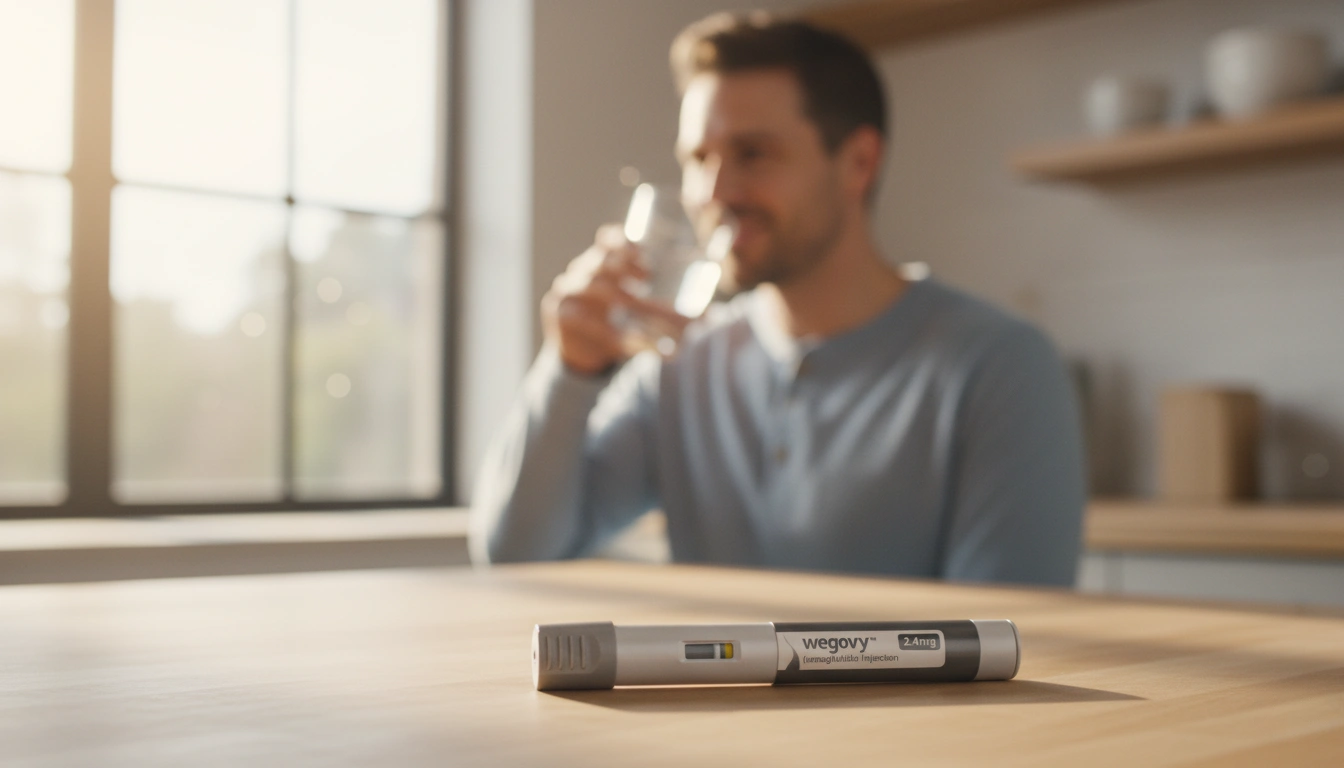Does Wegovy Cause Gastroparesis? What You Need to Know

Introduction
What if a medication designed to help you lose weight could also slow your stomach down so significantly that it feels like your digestion has frozen in time? For many taking popular weight loss drugs like Wegovy, this isn’t just a hypothetical question—it’s a daily reality that warrants careful consideration.
Wegovy, containing semaglutide, has revolutionized weight management by mimicking the gut hormone GLP-1, leading to reduced appetite and slower gastric emptying. While these effects promote satiety and support weight loss, they have also raised concerns about a condition known as gastroparesis, often described as “stomach paralysis.” But does Wegovy truly cause gastroparesis, and if so, how common and serious is this side effect?
In this article, we’ll explore the relationship between Wegovy and gastroparesis, unpack the science behind how GLP-1 receptor agonists work in the body, and analyze recent research to clarify what patients should know. We’ll also discuss how personalized, medically supervised weight loss programs, like those offered by TrimRx, can help manage risks and enhance treatment outcomes.
Together, we’ll explore:
- What gastroparesis is and how it differs from the effects of Wegovy
- Clinical evidence linking Wegovy and similar GLP-1 drugs to delayed gastric emptying
- How to differentiate minor side effects from serious complications
- Practical strategies to recognize symptoms and seek appropriate care
- How personalized assessment and support can optimize safety during your weight loss journey
Our goal is to provide you with a nuanced understanding that empowers you on your path to healthier living. So, if you’ve wondered, “Does Wegovy cause gastroparesis?” or if you’re considering a GLP-1 medication, this article is designed with you in mind.
Let’s begin by understanding the basics of gastroparesis.
What Is Gastroparesis?
Defining Gastroparesis
Gastroparesis is a medical condition characterized by delayed emptying of stomach contents into the small intestine without any mechanical blockage. Unlike a physical obstruction, in gastroparesis, the stomach muscles or the nerves controlling stomach contractions don’t work effectively, slowing digestion.
Common symptoms include:
- Nausea and vomiting
- Early satiety (feeling full quickly)
- Bloating and abdominal discomfort
- Loss of appetite
- Weight loss and malnutrition in severe cases
An estimated five million people in the U.S. suffer from gastroparesis or related gastric motility disorders. While diabetes is a leading cause, other factors like neurological conditions, surgeries, and certain medications can contribute as well.
Why Does Gastroparesis Matter?
Gastroparesis can significantly impair quality of life. Persistent nausea and vomiting affect nutrition and hydration; severe cases may necessitate medical interventions such as feeding tubes or surgery. Importantly, while gastroparesis is distinct from simple gastric “slowing,” it exists on a spectrum that includes mild to severe delayed gastric emptying.
Diagnosis and Testing
Diagnosing gastroparesis involves ruling out mechanical obstruction via endoscopy or imaging and measuring gastric emptying, often through gastric emptying scintigraphy (GES), which tracks how quickly food leaves the stomach. Retained food after several hours may signal delayed emptying, consistent with gastroparesis.
How Wegovy and GLP-1 Drugs Affect the Stomach
The Mechanism of Action: GLP-1 Receptor Agonists
Wegovy belongs to a class of medications known as GLP-1 receptor agonists. These drugs imitate the naturally occurring hormone glucagon-like peptide-1 (GLP-1), playing several roles:
- Stimulating insulin secretion in response to glucose
- Suppressing the release of glucagon (which raises blood sugar)
- Slowing gastric emptying to prolong the feeling of fullness
- Reducing appetite via brain receptors
The delayed gastric emptying effect is central to their weight loss capabilities. By slowing digestion, patients feel satiated longer and consume fewer calories.
The Fine Line Between Therapeutic Effect and Side Effect
This slow-down in stomach movement is expected—it’s how Wegovy helps reduce caloric intake. However, the effect can sometimes veer into problematic territory, contributing to symptoms such as nausea, vomiting, and bloating for some patients.
How common are these side effects?
- Clinical trials showed that nearly 44% of patients on Wegovy experienced nausea.
- Vomiting affected nearly 25%—both are hallmark symptoms associated with delayed gastric emptying.
- Most gastrointestinal symptoms are mild to moderate and improve over time.
Gastroparesis vs. Medication-Induced Slow Gastric Emptying
Not everyone who experiences nausea or delayed emptying while taking Wegovy has gastroparesis in the clinical sense. Gastroparesis refers to pathological delayed emptying causing significant symptoms and nutritional complications.
Recent studies indicate:
- Patients on GLP-1 drugs have a statistically higher likelihood of developing gastroparesis compared to those not on these medications.
- However, the overall incidence of gastroparesis remains low, generally less than 1% among users.
- Symptoms often improve upon discontinuation of the drug, highlighting a reversible effect rather than permanent “paralysis” of the stomach.
What Does Research Say About Wegovy and Gastroparesis?
Recent Clinical Studies and Data
A trio of studies presented at Digestive Disease Week in 2024 examined real-world data regarding GLP-1 receptor agonists and gastrointestinal side effects:
- One study including almost 300,000 patients found those on GLP-1 drugs were about 66% more likely to be diagnosed with gastroparesis, though actual diagnoses were rare (approximately 0.53%).
- Another longitudinal study observed increasing risk over 6 to 18 months of treatment, with up to a 25% higher chance of developing gastroparesis compared to matched controls.
- A subset undergoing gastric emptying scintigraphy revealed about one-third showed delayed emptying consistent with gastroparesis.
Clinical Interpretation
Experts generally caution that while there’s a measurable association, the absolute risk is low, and for most, gastroparesis symptoms are mild, manageable, and reversible.
Dr. Beverly Tchang, an endocrinologist noted that “gastroparesis is one mechanism through which GLP-1 drugs exert their effects… it’s an expected effect that can actually assist with weight loss by promoting satiety.”
However, for a small subset, severe symptoms including persistent vomiting and dehydration can occur, necessitating medical evaluation and possible discontinuation.
Case Reports and Patient Experiences
There are individual cases reported where patients have developed severe gastroparesis-like symptoms linked to Wegovy or Ozempic (another semaglutide product). Symptoms included prolonged vomiting, significant stomach bloating, and the need for hospitalization.
In these cases, stopping the medication usually leads to symptom improvement, though recovery time can vary.
Recognizing Symptoms and When to Seek Medical Advice
Common Side Effects vs. Warning Signs
Patients beginning Wegovy may experience:
- Mild nausea and occasional vomiting
- Bloating or fullness after small meals
These usually improve over weeks or with dosage adjustments.
Be vigilant for:
- Persistent vomiting multiple times a day
- Severe abdominal pain
- Signs of dehydration (dizziness, dry mouth)
- Inability to keep down fluids or food
- Weight loss due to inability to eat
These symptoms warrant prompt consultation with a healthcare professional.
Communicating with Your Medical Provider
Being open about symptoms and medication use is critical. Given the slowed gastric emptying effect, your medical team can adjust treatment plans or recommend additional testing like gastric emptying studies.
At TrimRx, our personalized weight loss programs include unlimited support and physician consultations to help you navigate side effects safely.
Managing Gastroparesis and GI Side Effects While on Wegovy
Lifestyle and Dietary Adjustments
For those experiencing mild GI symptoms related to delayed gastric emptying:
- Eat smaller, more frequent meals
- Choose low-fat and low-fiber foods to ease digestion
- Avoid eating late at night
- Stay well-hydrated, aiming for about 64 oz of water daily
- Avoid high-fat, fried, or sugary foods that can exacerbate symptoms
Medical Management
In some cases, doctors may prescribe medications to help improve stomach motility (prokinetics like metoclopramide) or to manage nausea (such as ondansetron). These treatments should be administered under medical supervision.
If symptoms are severe or persistent despite these measures, discontinuing the GLP-1 medication might be necessary.
The Importance of Personalized, Medically Supervised Weight Loss Programs
As you consider Wegovy or similar GLP-1 receptor agonists, it’s vital to approach treatment with personalized care.
Why Personalization Matters
Every individual’s response to medication differs, influenced by personal medical history, weight loss goals, and tolerance to side effects. TrimRx’s clinically proven weight loss programs start with a free personalized assessment quiz to determine eligibility and tailor treatments to your unique needs.
This process ensures:
- Safe initiation of medications like Wegovy under professional supervision
- Ongoing monitoring for side effects, including GI symptoms
- Access to comprehensive care including consultations, lab work, and unlimited support
- Partnership with FDA-registered pharmacies for safe medication delivery
TrimRx Quick-Access Supplements for GI Support
To support your digestive health during your weight loss journey, consider our easily accessible supplements designed to complement your program:
- GLP-1 Daily Support helps maintain gut wellness.
- Weight Loss Boost supports metabolic health and energy.
Both can be purchased without completing a quiz and integrate seamlessly with your personalized treatment.
Summary: Does Wegovy Cause Gastroparesis?
- Wegovy’s mechanism of delaying gastric emptying is a known, intended effect contributing to weight loss.
- Clinical evidence shows a slight increase in gastroparesis diagnoses among users, but the overall incidence remains very low.
- Most gastrointestinal side effects are mild, reversible, and manageable with lifestyle changes or medical support.
- Severe gastroparesis, while rare, requires prompt medical attention, and may necessitate stopping the medication.
- Personalized medical supervision optimizes safety and efficacy on your weight loss path.
Understanding these factors empowers you to make informed decisions. If you’re considering Wegovy or other GLP-1 medications, we encourage you to take our free assessment quiz to get started on a treatment plan tailored just for you.
FAQ
What is gastroparesis and how is it diagnosed?
Gastroparesis is delayed gastric emptying without mechanical obstruction, usually diagnosed through symptom evaluation and confirmed by gastric emptying studies, such as gastric emptying scintigraphy.
Is gastroparesis common among people taking Wegovy?
Gastroparesis is an uncommon but recognized side effect. Studies suggest less than 1% of patients develop clinically significant gastroparesis while on Wegovy or similar GLP-1 drugs.
How does Wegovy cause delayed gastric emptying?
Wegovy mimics the GLP-1 hormone, which slows stomach contractions and digestion to promote fullness, resulting in delayed gastric emptying as part of its weight loss effect.
Can gastroparesis caused by Wegovy be reversed?
Yes, in most cases, symptoms improve or resolve after stopping Wegovy or adjusting the dose, often with supportive care.
What symptoms should prompt me to see a doctor while on Wegovy?
Persistent vomiting, severe abdominal pain, inability to tolerate food or fluids, weight loss due to nausea, or signs of dehydration should all prompt medical evaluation.
How can I reduce the risk of GI side effects when starting Wegovy?
Starting with a low dose and gradually increasing as tolerated, eating small frequent meals, avoiding high-fat foods, and staying hydrated can help minimize gastrointestinal discomfort.
Does TrimRx provide support for managing these side effects?
Yes. TrimRx offers personalized, medically supervised weight loss programs that include doctor consultations, ongoing support, lab monitoring, and access to supplements for digestive wellness.
Can I get Wegovy or similar medications through TrimRx?
You can find out if you qualify for Wegovy, Ozempic®, or other semaglutide-based therapies by taking our free personalized assessment quiz.
At TrimRx, we’re committed to supporting your unique journey toward healthier living with science-backed, compassionate care. By integrating the latest evidence and personalized medical oversight, we help you navigate weight loss safely and effectively.
Ready to take the first step? Start your personalized assessment today and discover the best program for you.

Transforming Lives, One Step at a Time
Keep reading
Wegovy Results: Expected Weight Loss Timeline and Success Rates
Wegovy has transformed the weight loss medication landscape since its FDA approval in 2021. As the first semaglutide medication specifically approved for chronic weight…
Wegovy Cost: Insurance Coverage and Affordable Options
You’ve heard that Wegovy is the FDA-approved semaglutide specifically for weight loss, and you’re ready to ask your doctor about it. But when you…
How Many Doses of Wegovy Are There? A Comprehensive Guide to Your Treatment Plan
Wondering how many doses of Wegovy are there? Discover the full Wegovy dosing schedule, from initial steps to maintenance, and manage your weight effectively. Learn more!



